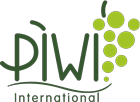Wine made from fungus-resistant vines (PiWi) was the subject of a slow food tasting in summer. Not only wine drinkers in our association know that Slow Food has so far been campaigning for traditional grape varieties threatened with extinction. Martin Wurzer-Berger on the tasting - and the advantages of these "new varieties". ....
THE SELECTED WINES
In addition to the mentioned Helios, a matured Bronner (2016er Grunerner Altenberg from the Köpfer winery in Staufen-Grunern), a dry Muscaris (2019er from the Andreas Dilger winery in Freiburg), two also dry Cabernet Blancs (both from the 2019 vintage: Winery Zähringer in Heitersheim and Lösskindl natural wine, Kiefer winery / Schmidt winery in Eichstetten) and a dry red wine cuvée (2018 Bacat: Freiburg State Winery made from Cabernet Carbon and Cabernet Cortis grape varieties).
Conclusion:
The general assessment of the four speakers is that the acceptance for PiWi varieties cannot be awakened overnight, but that this path will be extremely rewarding. Overall, this applies to the necessarily more complex view that we have to take on the conditions under which luxury foods and food are produced. ●
Author: Martin Wurzer-Berger
Source: SlowFood Magazin 5/2020

